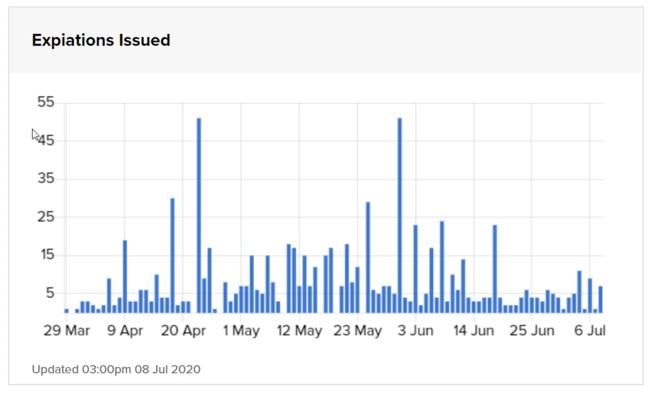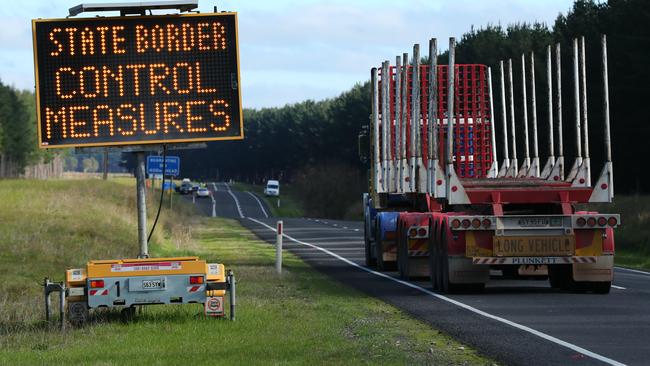Hundreds in SA hit with fines for breaking COVID-19 rules, as penalties approach half a million dollars
Coronavirus restriction breakers continue to be hit with big on-the-spot fines in SA. Hundreds of people and businesses have been stung, and some are trying to get relief from the courts.
- ‘Less pain than average’ for SA in shocker of a year
- Householders craving more space in the wake of COVID-19
- COVID queen: How Nicola became the face of our resistance
- Inside SA’s response to a deadly pandemic
Police have issued almost half a million dollars in fines to those who risked the health of South Australians by blatantly breaching COVID-19 restrictions.
Latest figures published by the State Government show SA Police have issued 805 expiations to people and businesses failing to follow health guidelines, with 434 resulting in fines.
It comes as authorities ramp up efforts to patrol the state’s border with Victoria to prevent the spread of Melbourne’s COVID-19 outbreak.
Individuals found breaking virus-related restrictions face a $1060 fine, while the cost to a body corporate is $5050. The total value of penalties now issued in SA is understood to total about $470,000.
However, documents provided to a parliamentary committee indicate that the amount to be recovered by the government will be less than that as people seek relief in the courts.

Premier Steven Marshall and Police Commissioner Grant Stevens announced the crackdown in March, as well as a regime of spot checks to ensure people were obeying health rules.
It included 14 days self-isolation for people who travelled or had the disease, as well as restrictions on the number of people who gathered in premises and at events – some of which have now be lifted.
Authorities said fines would be a last resort for flagrant flouting of the restrictions, and the first step would be to help people who were confused to understand their responsibilities.
More than 50,000 checks have been carried out on individuals and businesses. Police Minister Corey Wingard said the overwhelming majority of South Australians were doing the right thing, but outbreaks in Victoria showed a real risk of flare-ups remained.
“Our police have done an outstanding job keeping our state safe during the COVID-19 pandemic,” Mr Wingard said. “Along the borders they’ve been incredibly diligent in ensuring those who enter our state are complying with the directions.
“For the most part, South Australians have responded well to the restrictions put in place by the health experts, but for those who think they’re above the rules, significant fines do act as a deterrent.
“What’s happening over the border is a blunt reminder that we’re still living with COVID-19 and we cannot afford to become complacent.”

Treasurer Rob Lucas confirmed that the cash recovered from fines would be returned to general government revenue.
However, he expects an overall drop in fines across the year.
That comes after significant new penalties were brought in for lead-foot drivers that break the speed limit by large amounts, and a decrease in total traffic on the roads.
Government figures show significant spikes in COVID expiations issued on April 23 and May 31, when 51 were given on each day. SA’s outbreaks were most concerning in April, as clusters in the Barossa Valley were locked down and the heaviest restrictions were in place.
The spike of expiations in May came as the state was getting to grips with new rules around the first phase of restrictions easing and just before SA moved to increase gathering numbers.
A breakdown in fines for the first two and half months of the regime, obtained by Greens MP Tammy Franks, shows many being issued in country areas and Adelaide’s northern suburbs.
She said poorer areas of the state were more likely to be fined than warned.
“Clearly Burnside is being policed differently to Port Augusta and Whyalla,” she said.
“It’s disappointing, but probably a sign that people are more visible in those areas and less likely to get let off with cautions, and more likely to be over-policed.”
In April it was revealed a large number of expiations related to just a few major breaches including a couple of big house parties and hoon-driver gatherings.
